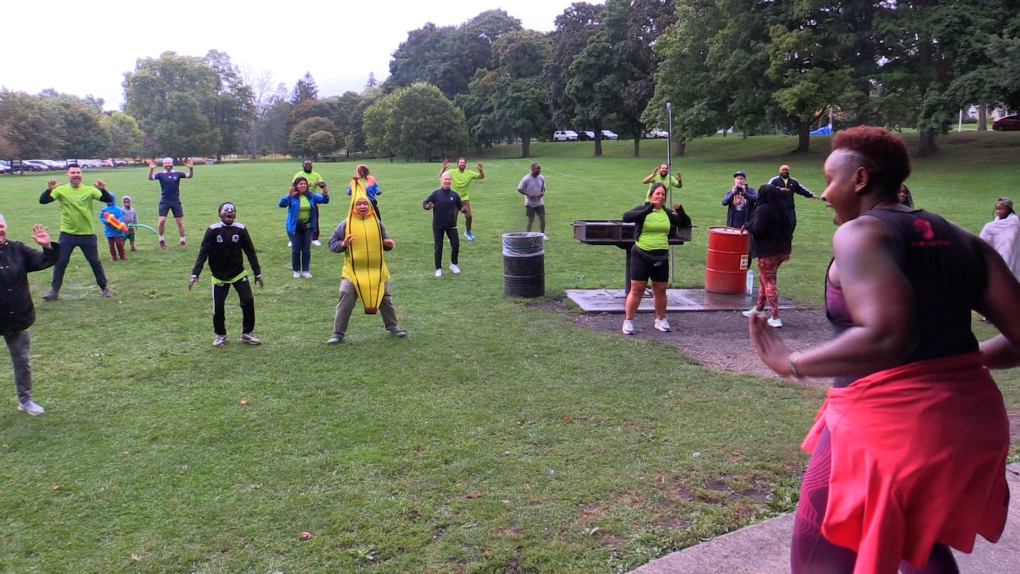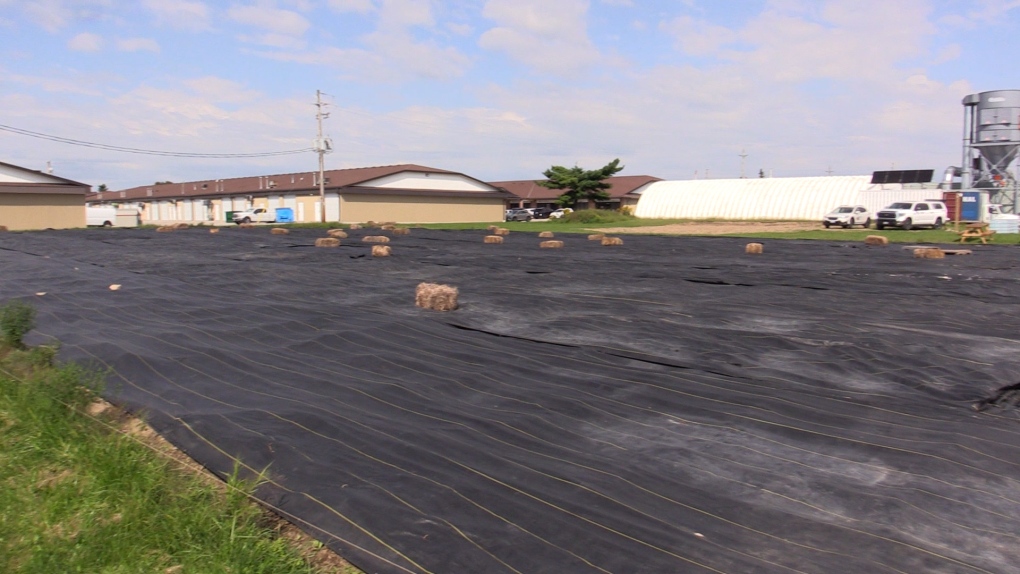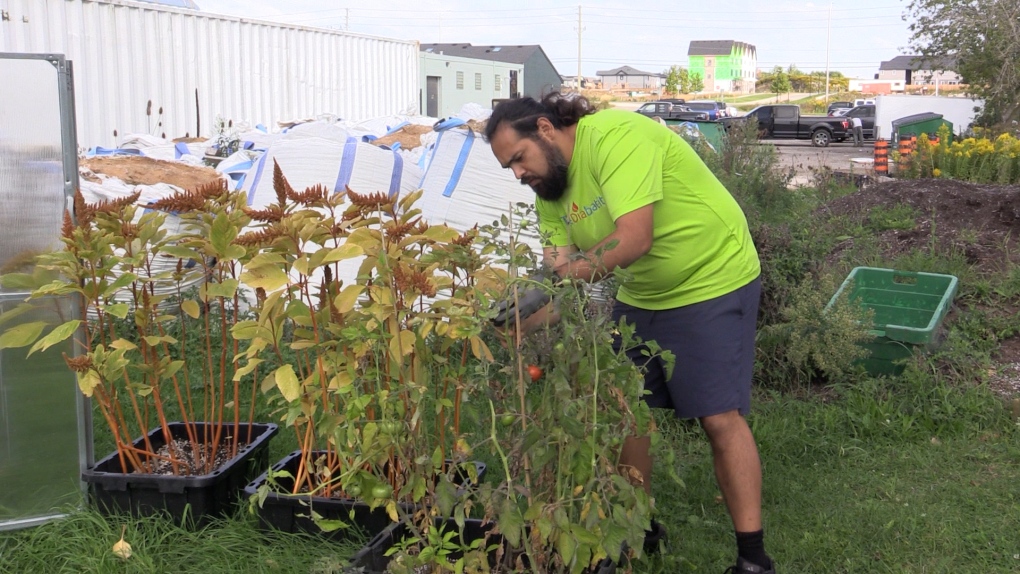'We grow collard greens, okra, callaloo': London non-profit helping BIPOC individuals manage their diabetes journey
In a small greenhouse on Exeter Road in London, Ont., a non-profit organization for Black, Indigenous, and People of Colour (BIPOC) individuals stay connected to their culture, but also manage their health.
“We've been able to cultivate a lot of okra, collard greens, callaloo, which not only to help reduce blood sugars, but also the cultural competency for families from Africa, the Middle East, India, Central America and the Caribbean,” said Mystery Furtado, CEO of Type Diabeat it.
The charity focuses on BIPOC diabetics, addressing food insecurity, access culturally fresh produce, and managing their diagnoses.
“We target people of colour because their numbers [of diabetics] is significantly higher in this community. In the most recent statistics 8.2 per cent of BIPOC individuals have diabetes comparted to four per cent,” said Furtado, who has a background in nursing and as a clinical educator. “Diabetes doesn’t care what skin colour you are.”
 Dina Umwali (right) leads a Zumba warmup for those taking part in the 5K walk for Type Diabeat It on Sept. 7, 2024 (Brent Lale/CTV News London)
Dina Umwali (right) leads a Zumba warmup for those taking part in the 5K walk for Type Diabeat It on Sept. 7, 2024 (Brent Lale/CTV News London)
Collette Chapman is one of those individuals who was diagnosed in 2019 with Type 2 diabetes. Originally from Guyana in South America, Chapman moved to the Forest City 24 years ago.
“Who doesn't like jerk chicken or plantain, rice and peas, but what exactly is that doing to us?” said Chapman. “A lot of things have a sugar component which can be problematic for us.”
Type Diabeat it helps people like Chapman manage the disease through exercise programs, guest speakers, and education.
“It's important for me to have someone who identifies and knows my culture as well,” said Chapman. “Part of it is our foods are different. So having that cultural connection and that understanding of still being able to enjoy the foods that I like, that are important to me, that define part of who I am, a part of my culture, and having someone who understands that and can provide some guidelines in terms of how much I can eat of this. In addition, they also assist with food boxes for you in terms of diabetic knowledge and awareness.”
This week, the group held its annual 5K walk, which, along with government grants, generates the funds needed for this program. That money also helps distribute food boxes to 150 London families every week.
Harvest Haven
The ‘Harvest Haven’ has big plans and dreams. Their 1.5-acre project behind Cardinal Fine Cabinetry on Exeter Road will be expanding. By next spring they will be growing food beside the greenhouse in an outdoor 26,000 square foot urban farm.
And this group has big dreams and plans. By spring, they'll be expanding. What? They're growing in the greenhouse to this 26,000 square foot urban farm.
It’s a three-phase project.
 Type Diabeat It is expanding with a 26,000 square foot urban farm on Exeter Road to grow more culturally appropriate health foods for people of colour who are diabetic. (Brent Lale/CTV News London)
Type Diabeat It is expanding with a 26,000 square foot urban farm on Exeter Road to grow more culturally appropriate health foods for people of colour who are diabetic. (Brent Lale/CTV News London)
“We were able to dig a well for water, so now we have the water and the electricity set,” said Gonzalo Gomez-Daza, the operations manager of Type Diabeat It. “We also tilled 26,000 square feet, did some trenching, and we’ll be fencing in this area. We're also going to be doing some raised beds so that people who have issues getting to the ground can still come and volunteer for us in the gardens and help grow more food for the community.”
Gomez-Daza came to Canada from Mexico, and believes this project is necessary to connect those in need of a handout with the appropriate foods.
“When we come to these countries, we seek help from food banks and we seek help from churches,” said Gomez-Daza. “A lot of the times we're stuck with a can of tomato soup that nobody's ever going to eat, and that ends up getting recycled through many families. Here we grow okra, we grow tomatillo, we grow collard greens. All of these foods are in high demand within our populations, and they are not going to get thrown out.”
 Gonzalo Gomez-Daza, operations manager of Type Diabeat It, works on plants outside the organization’s greenhouse on Exeter Rd. in London, Ont. on Sept. 7, 2024. (Brent Lale/CTV News London)
Gonzalo Gomez-Daza, operations manager of Type Diabeat It, works on plants outside the organization’s greenhouse on Exeter Rd. in London, Ont. on Sept. 7, 2024. (Brent Lale/CTV News London)
This group does more than just grow food in a greenhouse. They also provide food boxes for local families and educate children in schools.
“We have about 150 families that come pick up food from us, two times a week on Wednesdays and Fridays,” said Gomez-Daza. “We have a literacy program we teach during the school year. We are at basically a school every day, if not sometimes two schools a day teaching between 4,280 kids a day.”
Furtado said their goal is to focus on fresh produce as poverty has the greatest impact on health outcomes.
“It’s important because we grow culturally relevant food that goes back in the community to address food insecurity,” said Furtado. “Our goal is to help diabetics who are struggling to not only manage their diagnosis, but also to eat healthy.”
CTVNews.ca Top Stories

Trudeau calls violence in Montreal 'appalling' as NATO protest continues
Anti-NATO protesters gathered again in Montreal on Saturday to demand Canada withdraw from the alliance, a day after a demonstration organized by different groups resulted in arrests, burned cars and shattered windows.
7 suspects, including 13-year-old, charged following 'violent' home invasion north of Toronto
Seven teenage suspects, including a 13-year-old, have been arrested following a targeted and “violent” home invasion in Vaughan on Friday, police say.
These vascular risks are strongly associated with severe stroke, researchers say
Many risk factors can lead to a stroke, but the magnitude of risk from some of these conditions or behaviours may have a stronger association with severe stroke compared with mild stroke, according to a new study.
Widow of Chinese businessman who was executed for murder can sell her Vancouver house, court rules
A murder in China and a civil lawsuit in B.C. have been preventing the sale of multiple Vancouver homes, but one of them could soon hit the market after a court ruling.
Cher 'shocked' to discover her legal name when she applied to change it
Cher recalls a curious interlude from her rich and many-chaptered history in her new book 'Cher: The Memoir, Part One.'
Black bear killed in self-defence after attack on dog-walker in Maple Ridge, B.C.
A black bear has died following a brawl with a man on a trail in Maple Ridge, B.C.
Retiring? Here's how to switch from saving for your golden years to spending
The last paycheque from a decades-long career arrives next Friday and the nest egg you built during those working years will now turn into a main source of income. It can be a jarring switch from saving for retirement to spending in retirement.
Canadian neurosurgeons seek six patients for Musk's Neuralink brain study
Canadian neurosurgeons in partnership with Elon Musk's Neuralink have regulatory approval to recruit six patients with paralysis willing to have a thousand electrode contacts in their brains.
Police thought this gnome looked out of place. Then they tested it for drugs
During a recent narcotics investigation, Dutch police said they found a garden gnome made of approximately two kilograms of MDMA.

































